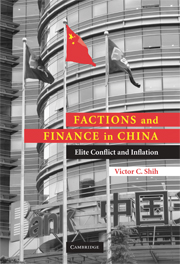Book contents
- Frontmatter
- Contents
- List of Tables and Figures
- Acknowledgments
- Abbreviations
- 1 Introduction
- 2 China's Financial Performance in Comparative Perspective
- 3 The Banking System: Flexible Institutions and Party Domination
- 4 Factional Politics and its Financial Implications
- 5 Factional Politics, Distribution of Loans, and Inflationary Cycles: Several Quantitative Tests
- 6 The Collapse of Discipline: The First Two Inflationary Cycles and the Fiscalization of Chinese Banks
- 7 The Height of the Politics of Inflation, 1987–1996
- 8 The Long Cycle: 1997–2006
- 9 Concluding Discussion
- Appendix on Data
- Bibliography
- Index
9 - Concluding Discussion
Published online by Cambridge University Press: 05 September 2012
- Frontmatter
- Contents
- List of Tables and Figures
- Acknowledgments
- Abbreviations
- 1 Introduction
- 2 China's Financial Performance in Comparative Perspective
- 3 The Banking System: Flexible Institutions and Party Domination
- 4 Factional Politics and its Financial Implications
- 5 Factional Politics, Distribution of Loans, and Inflationary Cycles: Several Quantitative Tests
- 6 The Collapse of Discipline: The First Two Inflationary Cycles and the Fiscalization of Chinese Banks
- 7 The Height of the Politics of Inflation, 1987–1996
- 8 The Long Cycle: 1997–2006
- 9 Concluding Discussion
- Appendix on Data
- Bibliography
- Index
Summary
The two contingent future paths for China's economy are both embedded in its financial sector. On the one hand, extremely rapid financial deepening accompanied by relatively stable prices drives a vigorous growth trajectory that will one-day make China the world's largest economy. On the other hand, the colossal store of nonperforming loans in the banking sector augurs stagnant growth and even an economic collapse. This study argued that China's elite political dynamic has played an important role in fashioning the foundation of both outcomes.
The persistent tension between generalist factions and technocratic factions engendered a credible constraint against high inflation. On the one hand, the generalist factions comprised mainly of local officials favored financial decentralization, which increased inflationary pressure since provincial leaders competed with one another to boost investment and, thus, lending and monetary expansion in their respective jurisdictions. On the other hand, central technocrats, whose power depended on accomplishing monumental tasks for the regime, had an interest to centralize financial authorities in order to finance major undertakings. The divergent policy preferences of these two types of factions meant that each sought to take advantage of both economic and political conditions to implement their preferred financial policies.
Because party generalists commanded authorities that allowed them to set the agenda in the elite decision process, under normal economic conditions, they could enact their favored policy of decentralizing financial authorities to the provinces.
- Type
- Chapter
- Information
- Factions and Finance in ChinaElite Conflict and Inflation, pp. 190 - 200Publisher: Cambridge University PressPrint publication year: 2007



